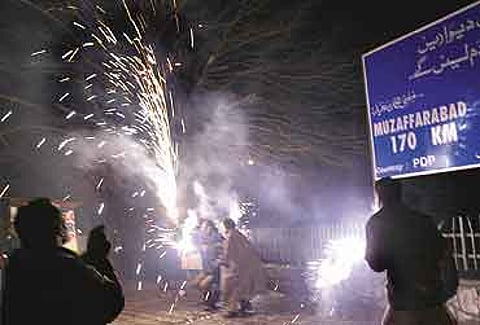A Line Is Crossed
Agreement on the Srinagar-Muzaffarabad bus service takes bilateral ties to a higher plane<a > Updates</a>

It will be easier to obtain entry permit for those visiting relatives whose identity is verifiable. But their permits will be confined to those places where their relatives are. Also, they won't be allowed a stay of more than a fortnight.
It is learnt that the modalities for travel had already been worked out before Natwar Singh landed in Islamabad. Both India and Pakistan resiled from their respective positions to accommodate each other. For instance, Pakistan had earlier argued that since the LoC wasn't an international border, a different set of procedures had to be followed when people crossed it. Pakistan's intention, say officials, was to ensure this didn't amount to a tacit formalisation of the LoC as IB. By contrast, India's insistence on passports had the opposite aim: consolidate the LoC as border, thereby emphasising that the status of J&K wasn't disputed.
The Pakistanis then suggested that the crossing across the LoC should be facilitated through United Nations offices, citing the example adopted for travel between North and South Cyprus.India countered saying the adopted procedure should suit the peculiarities of J&K. Also, Pakistan had wanted the travel facility restricted to Kashmiris, and between PoK and India's Kashmir. India argued otherwise and wanted people to travel in the entire erstwhile state of Jammu and Kashmir.
"What we have agreed to," said foreign secretary Shyam Saran, "is a humanitarian procedure, a practical procedure. Both sides have shown flexibility." Indeed, the bus proposal had been under discussion from the time Yashwant Sinha, the then external affairs minister, mooted the idea 28 months back. Saran said the agreement on the bus was proof of the peace process yielding results.
"I don't think we should minimise the achievements we have made," Saran asserted. He reeled off whatever he saw as positive developments: the ceasefire along the LoC had held for over a year; that people-to-people contacts assumed an unprecedented intensity. For instance, the Indian High Commission in Islamabad has been issuing 10,000 visas a month, a number higher than what is the case with even some friendly countries. More importantly, the captains of industry in India are demonstrating interest in Pakistan; Ratan Tata had only recently visited Islamabad.
There were also other indicators why Natwar's visit to Pakistan for bilaterals, the first in 16 years, can be called a success. For one, India has agreed to work out the technicalities to initiate the Amritsar-Lahore bus service, a suggestion Pakistan made two years ago. Again, in a new spirit of amity, New Delhi has also requested Pakistan to expedite the work on the Khokrapar-Munabao rail link. It's said Pakistani Prime Minister Shaukat Aziz has already made the necessary phone call to the railway authorities to put the project on the fast track. Pakistan had earlier sought time to upgrade its tracks to broad guage to operationalise the rail link. India has now apparently requested that the Pakistanis should use the existing metre gauge line till such time as the broad gauge line is laid.
In an additional display of pragmatism, the Indian side also agreed that the Iran-Pakistan-India pipeline would be viewed as a stand-alone project and not linked to the dynamics of bilateral economic interaction. Under the envisaged steps, India was prepared to receive Iran gas at an agreed point on the border with Pakistan. This would require an overarching trilateral agreement between the three participating countries and a bilateral agreement with Iran. Indian officials, however, wonder if the pipeline will materialise, given the American aversion to any country having a more than the barest minimum economic interaction with Iran.
On the economic side, there's going to be a joint study group meeting in New Delhi next week that is expected to come up with recommendations mutually beneficial to both countries. Natwar's visit seems to have resuscitated the peace process which, over the last few months, had been gasping for life, creating the spectre of both India and Pakistan returning to their sabre-rattling days.
Tags